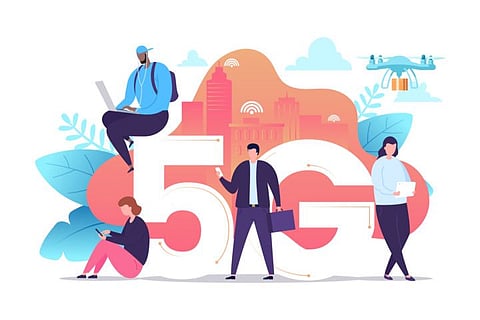What tech needs these days are fewer conspiracy theories
Saddling 5G technology with wild theories is harming the spread of progress

If your world felt very different in recent weeks, take comfort in the knowledge you were not alone. It is estimated a third of the global population had been in lockdown to try and contain the spread of Covid-19.
However, it has been reassuring to see that despite the disruption to lives, we have done our best to adapt. To continue with our daily lives and work, technology has been especially crucial to ensuring that we have all the essentials we rely upon to live and work.
Feverish fantasy making
My passion is exploring the yet untapped potential of digital transformation, and how we can embrace innovations as they emerge. In recent times there has been fearmongering and spread of disinformation, which undermine our transition into the Fourth Industrial Revolution.
This includes conspiracy theories that link 5G — the new technology standard for cellular network — to the spread of the novel coronavirus.
Covid-19 is spread by contact with another person or through respiratory droplets and contact, not radio waves. A coronavirus is a biological pathogen while radio waves exist on the electromagnetic spectrum. These are completely different forms that cannot interact.
There has also been no scientifically proven evidence that 5G can weaken the immune system. Also, it is important to point out that the coronavirus pandemic has hit countries where 5G is not even in use yet.
Living with tech
There are various industries that will depend on high-speed internet to revolutionise, reinvent and stay relevant, such as manufacturing, health care, transportation, education and even financial services. As we look to the future, technology — including faster networks — will be vital to the task of rebuilding our societies and economies in a post-Covid world.
The fifth generation of wireless networking technology is over 600 times faster than the typical 4G speeds on today’s mobile phones, and this will fuel imaginative innovation.
For example, lower latency — that is the delay or time it takes to send information from one point to the next — will transform remote learning in education by enabling virtual reality and augmented reality experiences. Faster connectivity promises to transform services in hospitals, enabling capabilities like holograph-assisted surgeries. Manufacturing has already been undergoing a revolution driven by robotics, artificial intelligence and analytics, and this will only continue to gain steam. Low-latency Internet of Things (IoT) networks will play big roles in agriculture and health care. Farmland will be peppered with sensors that collect data to feed back to machinery.
In health care, 5G is expected to enable virtual physical therapy and remote surgery. More immediately it will allow for greater remote care, particularly in rural communities and developing nations where hospitals are in short supply.
Can’t hold it back
In addition, 5G networks will help drive the development and adoption of autonomous vehicles. In cities, this has the potential to relieve traffic congestion and reduce air pollution from exhaust emissions. In rural areas, 5G could democratise communities’ access to technology, knowledge and support connecting them to the rest of the world.
In a world where remote working arrangements will become the norm, 5G dramatically increases the scope of activities. Hologram meetings are just one example of the way our digital interactions could improve immeasurably in the future.
To turn these great promises into reality, different stakeholders — hardware and software manufacturers, telcos, private and public sector — must invest in and encourage scientific research about the effects of 5G, in order to end this debate once and for all. I also encourage them to think about partnerships that will drive this growth.
Telco ways need reworking
Most obviously, telcos need to rethink their business model and how they can evolve from network-capacity providers to becoming innovative digital service partners and present new value propositions. Telcos are in a unique position to help enterprise customers unlock the potential of 5G, harness data to create new revenue streams and differentiated offerings.
To put this in numbers, telcos in the UAE stand to gain an additional $3.3 billion (Dh12.1 billion) in revenues by 2026 from the digitalisation of industries through 5G, according to an Ericsson report.
More broadly, the public and private sectors are poised to benefit from 5G networks to help build smart cities of the future. We know that we need to adjust to a new normal post-Covid-19, and that means providing communities with the flexibility and resilience to respond to unforeseen circumstances.
I urge all to be bold and continuously consider how technology could transform your business or industry. The pandemic has led to a fundamental shift in the way organisations think about their operations and it is a trend that will continue once the current crisis passes. We need to be prepared.
— Jihad Tayara is CEO of EVOTEQ.






